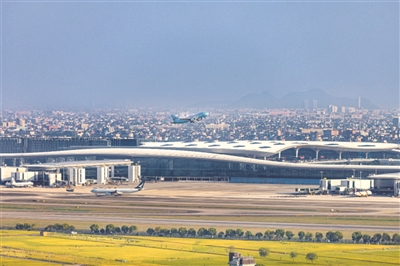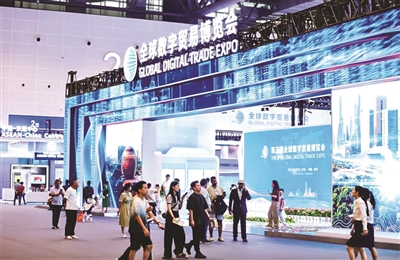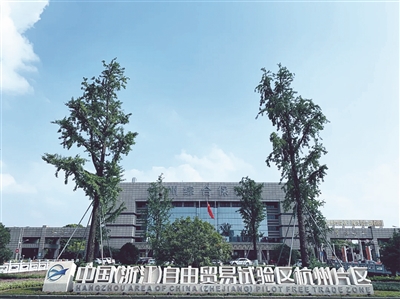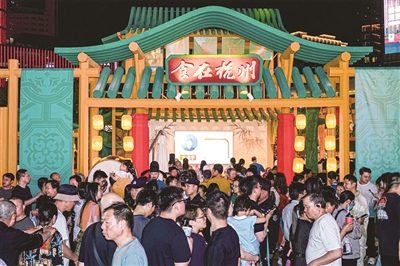



By Zhu Jingning
According to the recently released Global Cities Index 2024 by the Globalization and World Cities Study Group and Network (GaWC), Hangzhou has once again made the list as a Beta+ city, rising to 65th globally, marking its best historical performance.
Hangzhou first entered the official rankings in 2016, when it was ranked 140th out of 214 cities. By 2018, Hangzhou’s ranking had improved significantly to 75th. In 2022, it was listed as a Beta+ city for the first time, ranking 73rd globally.
The rise in ranking reflects the enhancement of Hangzhou’s urban development and openness. This also serves as a key source of confidence and support for Hangzhou’s efforts to build an open, international metropolis.
Energetic city
empowers urban opening
In recent years, Hangzhou has consistently prioritized urban internationalization as a fundamental and long-term endeavor. It was the first in the nation to introduce an internationalization regulation, release a five-year plan for internationalization, and establish the inaugural “Hangzhou International Day”.
The formation of every world-renowned city is inseparable from the strong drive of high-end international events. Leveraging opportunities provided by the G20 Hangzhou Summit and the 19th Hangzhou Asian Games, the city has significantly expanded its openness in scale and level. Numerous important international conferences, such as the AIPPI World Congress, Liangzhu Forum, Global Mayors Dialogue·Hangzhou, and the 9th Hangzhou International Sister City Mayors Conference, have further enhanced Hangzhou’s international reputation and appeal.
A strong “digital engine” continually expands new horizons for global trade and injects fresh momentum into Hangzhou’s open development. Hangzhou leads the nation in digital trade, hosting the only national first-class exhibition in the field: the Global Digital Trade Expo. It has pioneered local legislation for digital trade and introduced negative lists for cross-border data flows in e-commerce and clearing and settlement. From January to November 2024, Hangzhou’s digital delivery trade amounted to 156.2 billion yuan, and its service trade reached 370.3 billion yuan, accounting for 72.5% and 64.7% of the provincial totals, respectively.
Embracing innovation has led to both quantitative and qualitative improvements, reflected in the city’s foreign trade achievements. In 2023, Hangzhou’s total import and export volume surpassed 800 billion yuan for the first time. From July to November 2024, exports maintained double-digit growth for five consecutive months, reaching 519.32 billion yuan from January to November, representing 2.25% of the national total.
In December 2024, Chanel revealed its 2024/25 Métiers d'Art collection in Hangzhou, making it the third Asian city, after Tokyo and Shanghai, to host the global debut of this series. The choice of Hangzhou by an international luxury brand for this fashion event demonstrates the recognition of the city’s vibrant and leading consumer market.
From January to November 2024, Hangzhou achieved a retail sales volume of 713.1 billion yuan and an online retail volume of 1.18 trillion yuan. The city leads the nation in the number of high-quality pedestrian streets, smart commercial districts, and smart stores, and has achieved full coverage of departure tax refund stores across the city.
Exploring the road
to urban opening and upgrading
Hangzhou is poised to elevate its internationalization level with a solid foundation in industrial internationalization and a distinctive advantage as a center for international exchanges.
The city has hosted the Global Digital Trade Expo, which has led to the creation of over 150 innovative digital trade institutional outcomes. In Hangzhou, known as the “first city of the digital economy”, the “digital characteristics” are deeply ingrained in the city’s fabric.
The Global Digital Trade Expo, permanently based in Hangzhou, is held annually in September at the Hangzhou Convention and Exhibition Center. Within a two-square-kilometer radius around the center, a digital trade innovation port is being developed, integrating high-end exhibitions, headquarters economy and trade services, forming a “digital trade + exhibition” industry cluster.
The three free trade zone areas of Binjiang, Xiaoshan, and Qiantang focus on developing digital trade characteristic industry chains, relying on national characteristic service export bases, small towns, and industrial platforms within the zones. These core areas will achieve differentiated development: Binjiang will develop data resources and property rights transactions, internet-related services, etc. In Qiantang district, the total foreign trade volume is expected to exceed 70 billion yuan for the first time in 2024.
With the construction of the Global Digital Trade Port core area, Hangzhou aims to achieve a digital trade volume of 440 billion yuan in the core area by 2027, with more than 350 global brands in the digital trade sector, over 1,600 large-scale enterprises, and more than 35 globally competitive platform enterprises.
Looking ahead, Hangzhou will steadily expand its institutional openness in terms of rules, regulations, management, and standards, focusing on upgrading the development of open platforms, foreign trade and foreign investment, international exchanges, and regional cooperation.
The task list includes the approval of the fourth phase of Hangzhou Airport, active promotion of the friendship between Hangzhou and Italy’s Verona, new international organizations’ headquarters or branches settled in Hangzhou, such as the World Intellectual Property Organization and the International Silk Organization, and hosting the third stage of the 2026 World Cup Asian qualifiers in China. Stay tuned!
